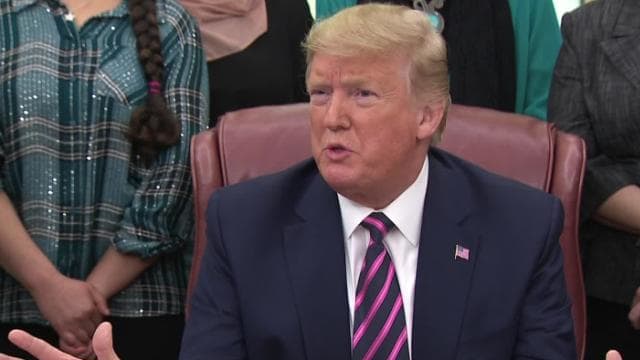
There are various names being bandied about as potential witnesses for the impending impeachment trial of Donald Trump, from former national security adviser John Bolton to Joe Biden's son, Hunter. But the one name that has been left out is the very person who possesses by far the greatest amount of detailed knowledge of the key issues: Donald J. Trump.
This is especially true given the new bombshell statements of Lev Parnas, who said that he was directed by Trump's personal lawyer Rudy Giuliani to tell a Ukrainian official that the Trump administration would be withholding all aid, including military, unless the Ukrainian government agreed to announce an investigation into Joe Biden and his son, Hunter.
Parnas, who is under indictment for alleged campaign finance related crimes, claims -- despite Trump's denial -- that the two were friends and Trump knew exactly what he was up to regarding the demand to the Ukrainian government.
Seemingly supporting Parnas' claim that he and Trump knew each other is an October 3, 2019, letter sent by former Trump lawyer John Dowd, who was representing Parnas at the time. The letter, a response to a congressional subpoena sent to Parnas, stated that Parnas had "assisted Mr. Giuliani in connection with his representation of President Trump," and thus, certain information Congress sought may be privileged.
Adding to the intrigue is an October 2, 2019, email -- released by the House this week -- from Trump's personal lawyer Jay Sekulow to Dowd stating, "I have discussed the issue of representation with the President," adding that Trump had consented to Dowd representing Parnas.
The only way to get to the bottom of this is to hear from Trump -- under oath. After all, who else knows more about the the details surrounding the allegations contained in the first article of impeachment charging Trump with "abuse of power" which states, "... Trump solicited the interference of a foreign government, Ukraine, in the 2020 United States presidential election ... in pursuit of personal political benefit."
Same goes for article two, "obstruction of Congress," where it charges that Trump "directed Executive Branch agencies, offices and officials not to comply with" subpoenas served by the House.
In fact, Trump declared in November that he would "strongly consider" testifying in the impeachment inquiry that was then being conducted. And before that, during special counsel Robert Mueller's investigation examining "any links and/or coordination" between the Russian governing and he Trump campaign, when asked if he would testify, Trump boasted, "I'm looking forward to it actually," adding, "I would do it under oath, absolutely."
Well, the Senate trial is the perfect place for Trump to get his wish.
Here, with the nation watching, Trump can finally give the Senate jury -- and the American people -- answers to all of the questions surrounding his actions with the Ukrainian leader, the withholding of US military aid to Ukraine, why he stonewalled duly served subpoenas served by Congress, and more.
Just so it's clear, there's no legal prohibition that would prevent the Senate from calling Trump as a witness. This isn't a criminal trial where the Fifth Amendment guarantees that a person cannot be "compelled ... to be a witness against himself."
There's no chance the Senate can sentence Trump to prison. In fact, the US Constitution plainly states that in Article 1, Section 3 that the only penalty Trump faces is "removal from office" and disqualification to hold any elected office in the future.
And if Trump is asked a question by the House managers that he believes could be incriminating in a subsequent criminal trial, his lawyers would have the absolute right to object to that question, invoking Trump's 5th Amendment right against self-incrimination.
Add to that, Trump testifying at this trial is consistent with GOP Senate Majority Leader Mitch McConnell's desire to follow the precedent of former President Bill Clinton's 1999 impeachment trial. In his trial, President Clinton's grand jury testimony -- prior to the trial -- was a big part. (Clinton had voluntarily agreed to be deposed by independent counsel Kenneth Starr in connection with his investigation surrounding Clinton's affair with White House intern Monica Lewinsky.)
Clinton's testimony was quoted in the briefs of the GOP House managers in numerous places, including in trying to ascertain "The President's Intention" (as it was labeled in the House's trial memorandum) concerning the charges that Clinton committed perjury and obstructed justice.
And Clinton's testimony was cited by the GOP House managers in making their case, such as when Rep. James Sensenbrenner stated, "I wish to point out four glaring examples of William Jefferson Clinton's perjurious, false and misleading statements to the grand jury." Clinton was acquitted in the Senate.
In keeping with the precedent of Clinton's trial, the testimony of Trump should be a part of this one.
The senators who will serve as jurors need to know all the facts to reach an informed verdict. Not calling Trump to testify under oath will turn this constitutionally mandated trial into a partisan cover-up. The stakes for our nation are simply too high to allow that to happen.